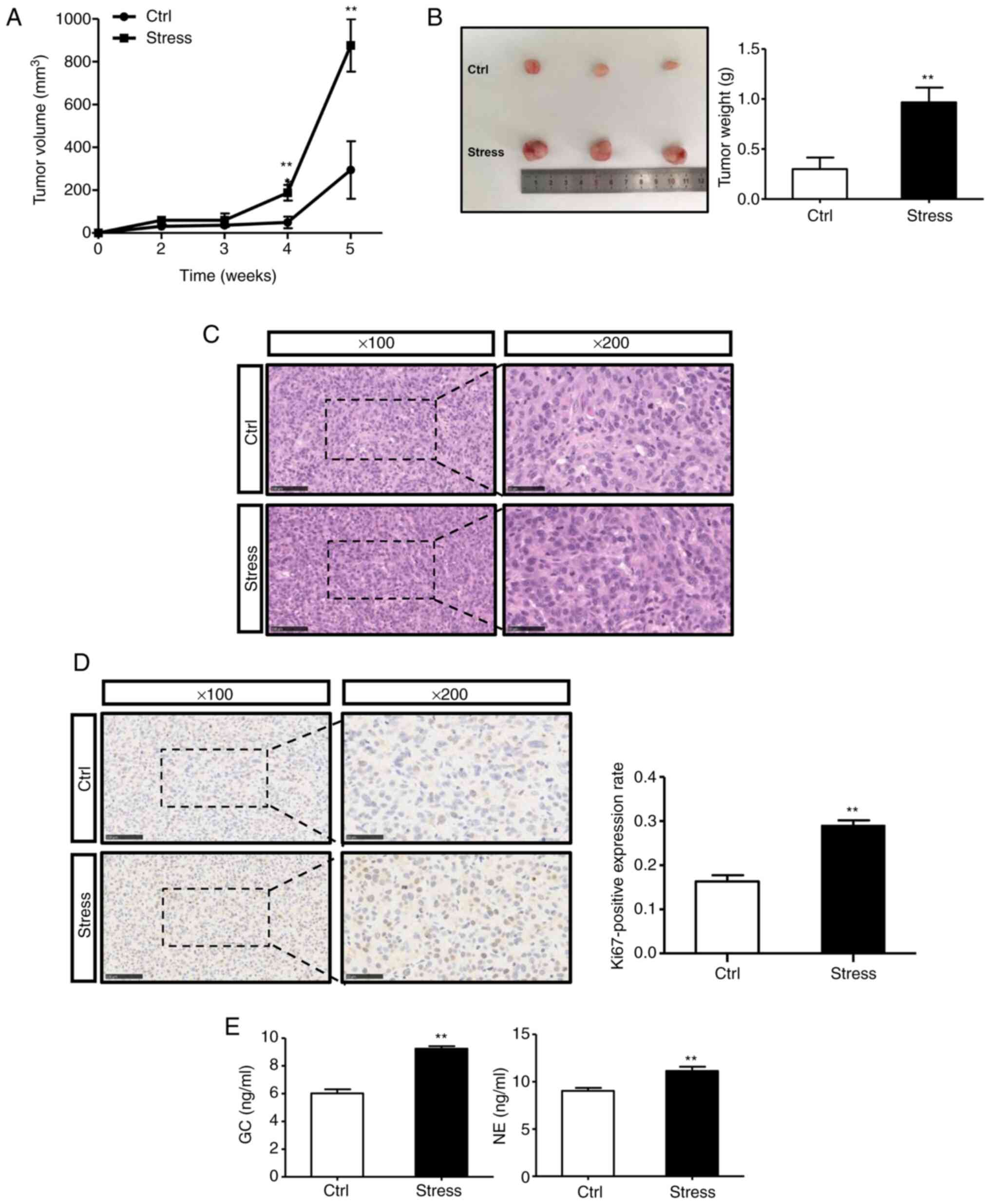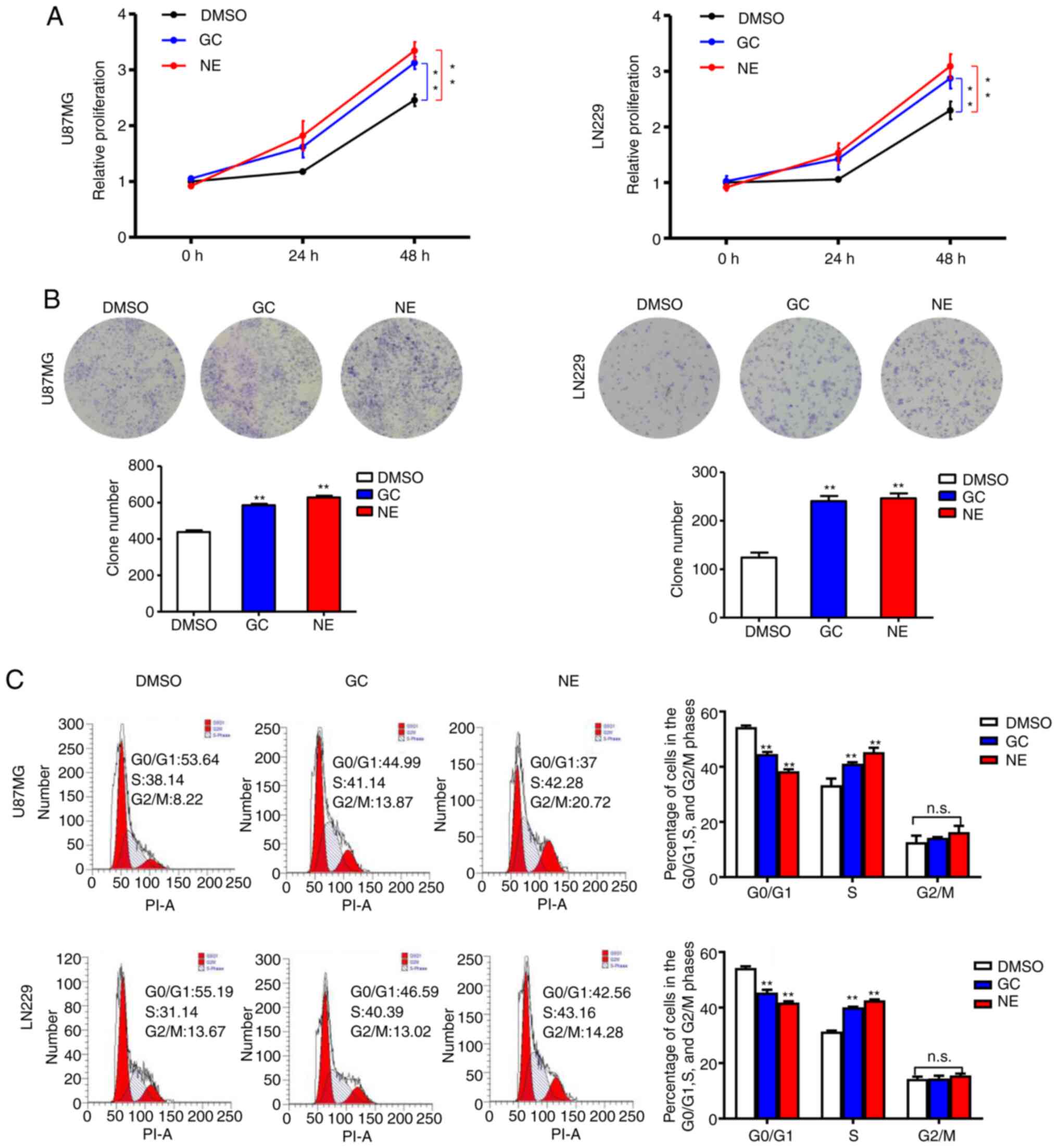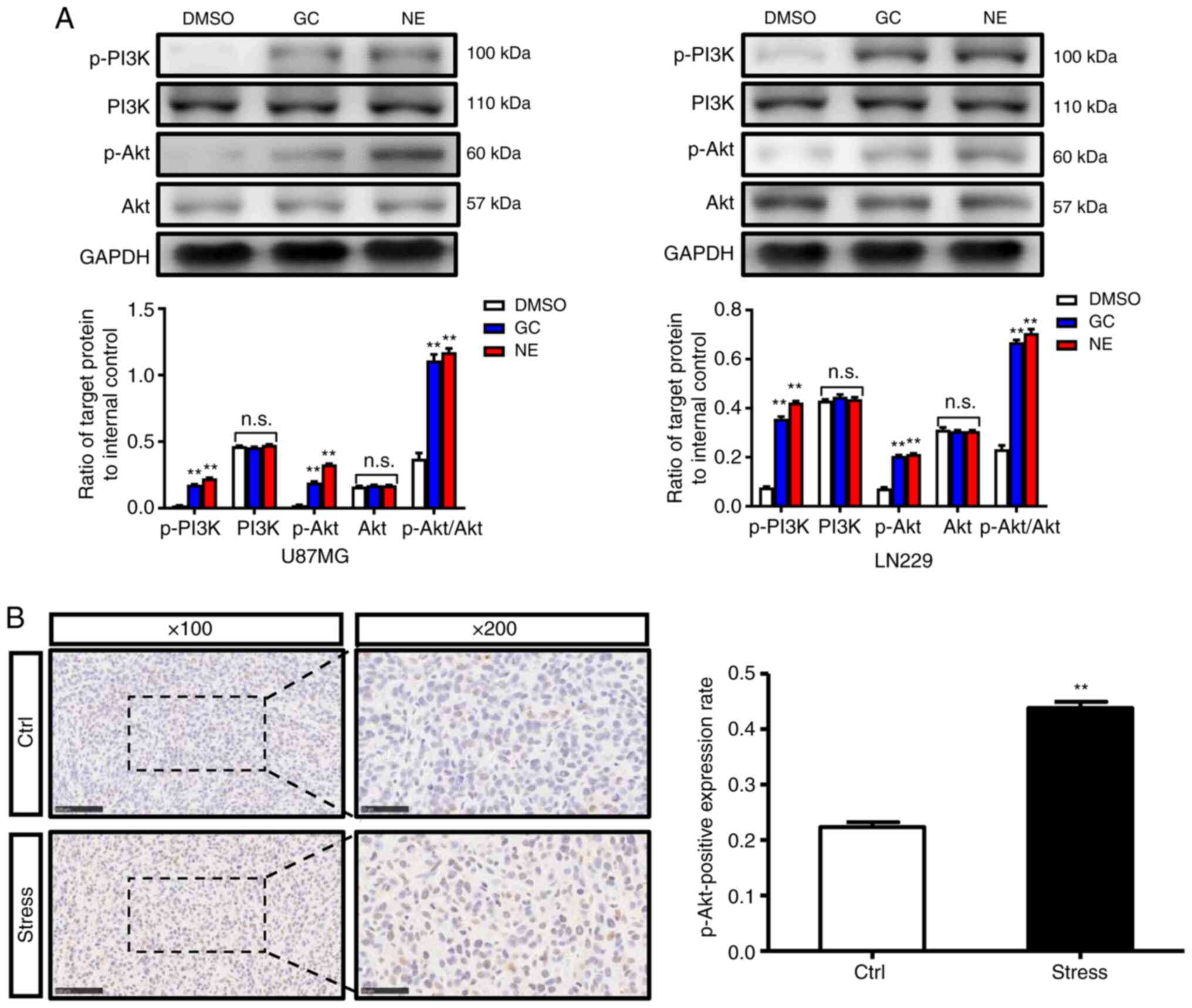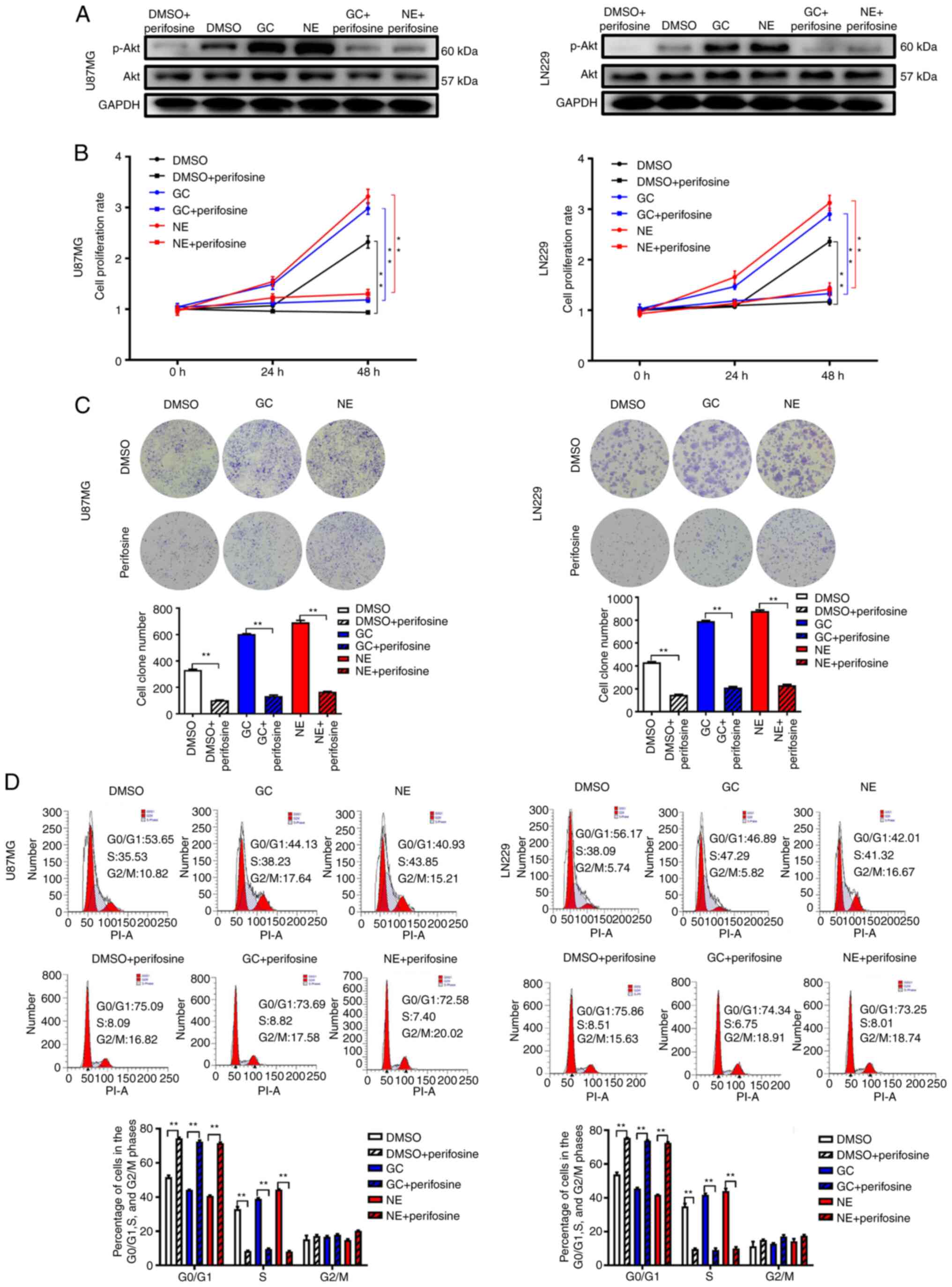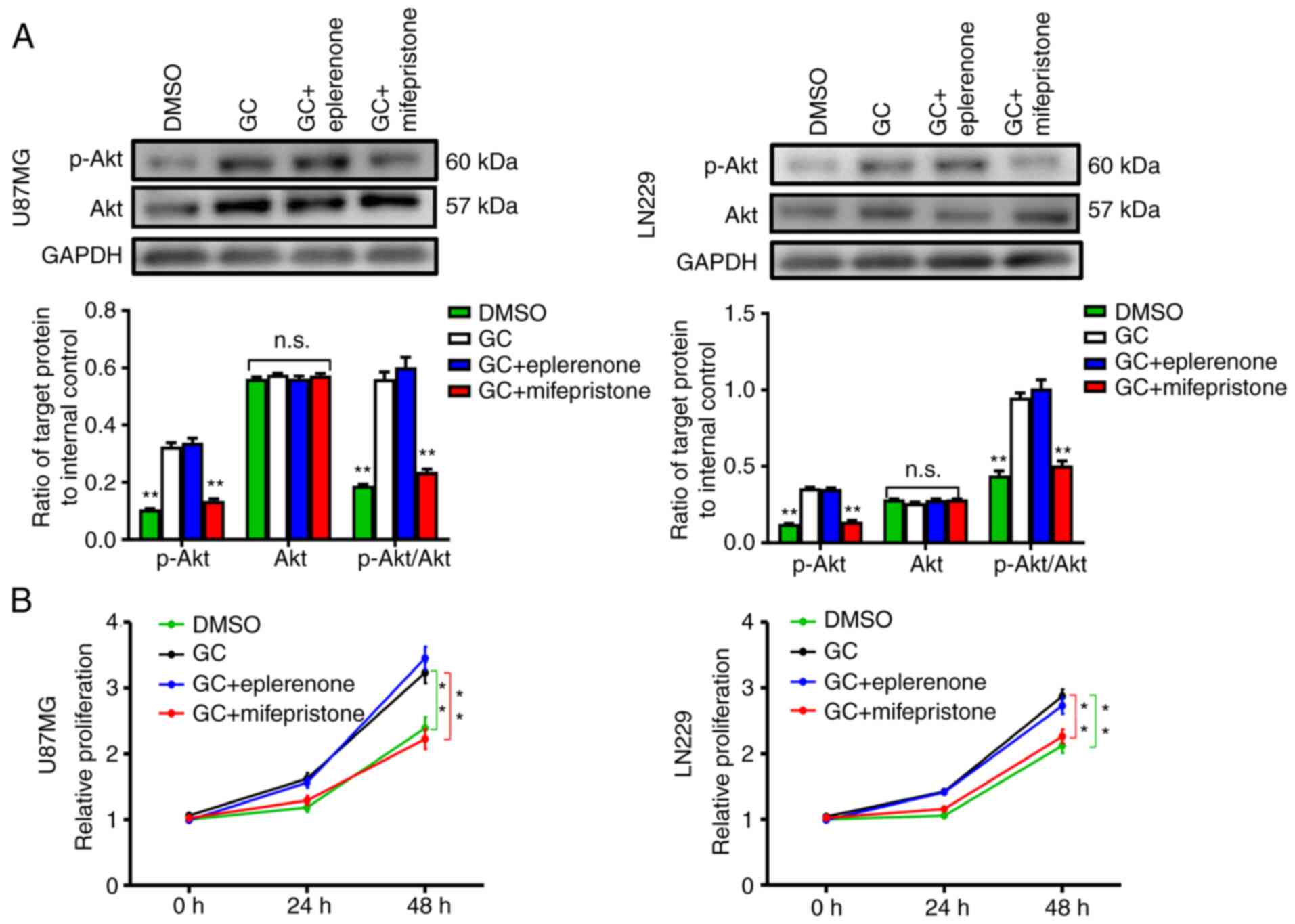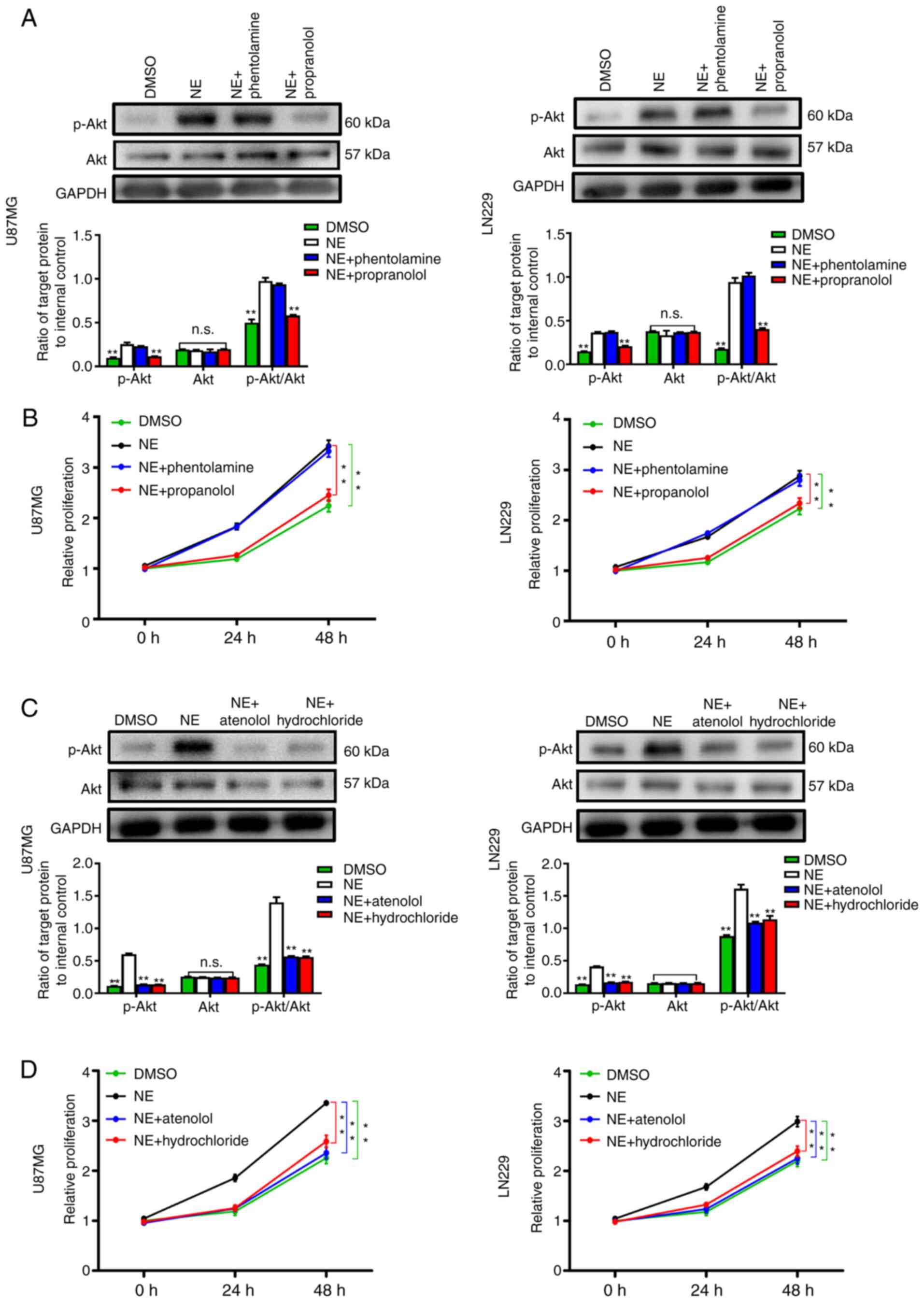|
1
|
Ostrom QT, Gittleman H, Fulop J, Liu M,
Blanda R, Kromer C, Wolinsky Y, Kruchko C and Barnholtz-Sloan JS:
CBTRUS statistical report: Primary brain and central nervous system
tumors diagnosed in the united states in 2008–2012. Neuro Oncol. 17
(Suppl 4):iv1–iv62. 2015. View Article : Google Scholar : PubMed/NCBI
|
|
2
|
Chinot OL, Wick W, Mason W, Henriksson R,
Saran F, Nishikawa R, Carpentier AF, Hoang-Xuan K, Kavan P, Cernea
D, et al: Bevacizumab plus radiotherapy-temozolomide for newly
diagnosed glioblastoma. N Engl J Med. 370:709–722. 2014. View Article : Google Scholar : PubMed/NCBI
|
|
3
|
Cuddapah VA, Robel S, Watkins S and
Sontheimer H: A neurocentric perspective on glioma invasion. Nat
Rev Neurosci. 15:455–465. 2014. View
Article : Google Scholar : PubMed/NCBI
|
|
4
|
Chen J, McKay RM and Parada LF: Malignant
glioma: Lessons from genomics, mouse models, and stem cells. Cell.
149:36–47. 2012. View Article : Google Scholar : PubMed/NCBI
|
|
5
|
Gately L, McLachlan SA, Dowling A and
Philip J: Life beyond a diagnosis of glioblastoma: A systematic
review of the literature. J Cancer Surviv. 11:447–452. 2017.
View Article : Google Scholar : PubMed/NCBI
|
|
6
|
Lacroix M, Abi-Said D, Fourney DR,
Gokaslan ZL, Shi W, DeMonte F, Lang FF, McCutcheon IE, Hassenbusch
SJ, Holland E, et al: A multivariate analysis of 416 patients with
glioblastoma multiforme: Prognosis, extent of resection, and
survival. J Neurosurg. 95:190–198. 2001. View Article : Google Scholar : PubMed/NCBI
|
|
7
|
Carlsson SK, Brothers SP and Wahlestedt C:
Wahlestedt, Emerging treatment strategies for glioblastoma
multiforme. EMBO Mol Med. 6:1359–1370. 2014. View Article : Google Scholar : PubMed/NCBI
|
|
8
|
Witthayanuwat S, Pesee M, Supaadirek C,
Supakalin N, Thamronganantasakul K and Krusun S: Survival analysis
of glioblastoma multiforme. Asian Pac J Cancer Prev. 19:2613–2617.
2018.PubMed/NCBI
|
|
9
|
Omuro A and DeAngelis LM: Glioblastoma and
other malignant gliomas: A clinical review. JAMA. 310:1842–1850.
2013. View Article : Google Scholar : PubMed/NCBI
|
|
10
|
Graham J, Ramirez A, Love S, Richards M
and Burgess C: Stressful life experiences and risk of relapse of
breast cancer: Observational cohort study. BMJ. 324:14202002.
View Article : Google Scholar : PubMed/NCBI
|
|
11
|
Chida Y, Hamer M, Wardle J and Steptoe A:
Do stress-related psychosocial factors contribute to cancer
incidence and survival? Nat Clin Pract Oncol. 5:466–475. 2008.
View Article : Google Scholar : PubMed/NCBI
|
|
12
|
Magnon C, Hall SJ, Lin J, Xue X, Gerber L,
Freedland SJ and Frenette PS: Autonomic nerve development
contributes to prostate cancer progression. Asian J Androl.
15:713–714. 2013. View Article : Google Scholar : PubMed/NCBI
|
|
13
|
Gray JD, Kogan JF, Marrocco J and McEwen
BS: Genomic and epigenomic mechanisms of glucocorticoids in the
brain. Nat Rev Endocrinol. 13:661–673. 2017. View Article : Google Scholar : PubMed/NCBI
|
|
14
|
Yang H, Xia L, Chen J, Zhang S, Martin V,
Li Q, Lin S, Chen J, Calmette J, Lu M, et al:
Stress-glucocorticoid-TSC22D3 axis compromises therapy-induced
antitumor immunity. Nat Med. 25:1428–1441. 2019. View Article : Google Scholar : PubMed/NCBI
|
|
15
|
Volden PA and Conzen SD: The influence of
glucocorticoid signaling on tumor progression. Brain Behav Immun.
30 (Suppl):S26–S31. 2013. View Article : Google Scholar : PubMed/NCBI
|
|
16
|
Skor MN, Wonder EL, Kocherginsky M, Goyal
A, Hall BA, Cai Y and Conzen SD: Glucocorticoid receptor antagonism
as a novel therapy for triple-negative breast cancer. Clin Cancer
Res. 19:6163–6172. 2013. View Article : Google Scholar : PubMed/NCBI
|
|
17
|
Thaker PH, Han LY, Kamat AA, Arevalo JM,
Takahashi R, Lu C, Jennings NB, Armaiz-Pena G, Bankson JA, Ravoori
M, et al: Chronic stress promotes tumor growth and angiogenesis in
a mouse model of ovarian carcinoma. Nat Med. 12:939–944. 2006.
View Article : Google Scholar : PubMed/NCBI
|
|
18
|
Park SY, Kang JH, Jeong KJ, Lee J, Han JW,
Choi WS, Kim YK, Kang J, Park CG and Lee HY: Norepinephrine induces
VEGF expression and angiogenesis by a hypoxia-inducible factor-1α
protein-dependent mechanism. Int J Cancer. 128:2306–2316. 2011.
View Article : Google Scholar : PubMed/NCBI
|
|
19
|
Radu M, Semenova G, Kosoff R and Chernoff
J: PAK signalling during the development and progression of cancer.
Nat Rev Cancer. 14:13–25. 2014. View Article : Google Scholar : PubMed/NCBI
|
|
20
|
Park MH, Lee HS, Lee CS, You ST, Kim DJ,
Park BH, Kang MJ, Heo WD, Shin EY, Schwartz MA and Kim EG:
p21-Activated kinase 4 promotes prostate cancer progression through
CREB. Oncogene. 32:2475–2482. 2013. View Article : Google Scholar : PubMed/NCBI
|
|
21
|
Le CP, Nowell CJ, Kim-Fuchs C, Botteri E,
Hiller JG, Ismail H, Pimentel MA, Chai MG, Karnezis T, Rotmensz N,
et al: Chronic stress in mice remodels lymph vasculature to promote
tumour cell dissemination. Nat Commun. 7:106342016. View Article : Google Scholar : PubMed/NCBI
|
|
22
|
Na Z, Qiao X, Hao X, Fan L, Xiao Y, Shao
Y, Sun M, Feng Z, Guo W, Li J, et al: The effects of beta-blocker
use on cancer prognosis: A meta-analysis based on 319,006 patients.
Onco Targets Ther. 11:4913–4944. 2018. View Article : Google Scholar : PubMed/NCBI
|
|
23
|
Lamkin DM, Sung HY, Yang GS, David JM, Ma
JC, Cole SW and Sloan EK: α2-Adrenergic blockade mimics the
enhancing effect of chronic stress on breast cancer progression.
Psychoneuroendocrinology. 51:262–270. 2015. View Article : Google Scholar : PubMed/NCBI
|
|
24
|
Gao J, Liu X, Yang F, Liu T, Yan Q and
Yang X: By inhibiting Ras/Raf/ERK and MMP-9, knockdown of EpCAM
inhibits breast cancer cell growth and metastasis. Oncotarget.
6:27187–27198. 2015. View Article : Google Scholar : PubMed/NCBI
|
|
25
|
Das S: MDM2 Inhibition in a subset of
sarcoma cell lines increases susceptibility to radiation therapy by
inducing senescence in the polyploid cells. Adv Radiat Oncol.
5:250–259. 2020. View Article : Google Scholar : PubMed/NCBI
|
|
26
|
O'Donnell JS, Massi D, Teng MWL and
Mandala M: PI3K-AKT-mTOR inhibition in cancer immunotherapy, redux.
Semin Cancer Biol. 48:91–103. 2018. View Article : Google Scholar : PubMed/NCBI
|
|
27
|
Jia X, Wen Z, Sun Q, Zhao X, Yang H, Shi X
and Xin T: Apatinib suppresses the proliferation and apoptosis of
gastric cancer cells via the PI3K/Akt signaling pathway. J buon.
24:1985–1991. 2019.PubMed/NCBI
|
|
28
|
Chen H, Zhou L, Wu X, Li R, Wen J, Sha J
and Wen X: The PI3K/AKT pathway in the pathogenesis of prostate
cancer. Front Biosci (Landmark Ed). 21:1084–1091. 2016. View Article : Google Scholar : PubMed/NCBI
|
|
29
|
Costa RLB, Han HS and Gradishar WJ:
Targeting the PI3K/AKT/mTOR pathway in triple-negative breast
cancer: A review. Breast Cancer Res Treat. 169:397–406. 2018.
View Article : Google Scholar : PubMed/NCBI
|
|
30
|
Ediriweera MK, Tennekoon KH and Samarakoon
SR: Role of the PI3K/AKT/mTOR signaling pathway in ovarian cancer:
Biological and therapeutic significance. Semin Cancer Biol.
59:147–160. 2019. View Article : Google Scholar : PubMed/NCBI
|
|
31
|
Cui B, Luo Y, Tian P, Peng F, Lu J, Yang
Y, Su Q, Liu B, Yu J, Luo X, et al: Stress-induced epinephrine
enhances lactate dehydrogenase A and promotes breast cancer
stem-like cells. J Clin Invest. 129:1030–1046. 2019. View Article : Google Scholar : PubMed/NCBI
|
|
32
|
Chen D, Tan Y, Li Z, Li W, Yu L, Chen W,
Liu Y, Liu L, Guo L, Huang W and Zhao Y: Organoid cultures derived
from patients with papillary thyroid cancer. J Clin Endocrinol
Metab. 106:1410–1426. 2021. View Article : Google Scholar : PubMed/NCBI
|
|
33
|
Hu R, Li X, Peng C, Gao R, Ma L, Hu J, Luo
T, Qing H, Wang Y, Ge Q, et al: miR-196b-5p-enriched extracellular
vesicles from tubular epithelial cells mediated aldosterone-induced
renal fibrosis in mice with diabetes. BMJ Open Diabetes Res Care.
8:e0011012020. View Article : Google Scholar : PubMed/NCBI
|
|
34
|
Livak KJ and Schmittgen TD: Analysis of
relative gene expression data using real-time quantitative PCR and
the 2(-Delta Delta C(T)) method. Methods. 25:402–408. 2001.
View Article : Google Scholar : PubMed/NCBI
|
|
35
|
Zhe D, Fang H and Yuxiu S: Expressions of
hippocampal mineralocorticoid receptor (MR) and glucocorticoid
receptor (GR) in the single-prolonged stress-rats. Acta Histochem
Cytochem. 28(41): 89–95. 2008. View Article : Google Scholar : PubMed/NCBI
|
|
36
|
Zhang D, Ma Q, Shen S and Hu H: Inhibition
of pancreatic cancer cell proliferation by propranolol occurs
through apoptosis induction: The study of beta-adrenoceptor
antagonist's anticancer effect in pancreatic cancer cell. Pancreas.
38:94–100. 2009. View Article : Google Scholar : PubMed/NCBI
|
|
37
|
Surman M and Janik ME: Stress and its
molecular consequences in cancer progression. Postepy Hig Med Dosw
(Online). 71:485–499. 2017. View Article : Google Scholar : PubMed/NCBI
|
|
38
|
Umamaheswaran S, Dasari SK, Yang P,
Lutgendorf SK and Sood AK: Stress, inflammation, and eicosanoids:
An emerging perspective. Cancer Metastasis Rev. 37:203–211. 2018.
View Article : Google Scholar : PubMed/NCBI
|
|
39
|
Zhang X, Zhang Y, He Z, Yin K, Li B, Zhang
L and Xu Z: Chronic stress promotes gastric cancer progression and
metastasis: An essential role for ADRB2. Cell Death Dis.
10:7882019. View Article : Google Scholar : PubMed/NCBI
|
|
40
|
Starr LR, Dienes K, Li YI and Shaw ZA:
Chronic stress exposure, diurnal cortisol slope, and implications
for mood and fatigue: Moderation by multilocus HPA-Axis genetic
variation. Psychoneuroendocrinology. 100:156–163. 2019. View Article : Google Scholar : PubMed/NCBI
|
|
41
|
Verbeek E, Colditz I, Blache D and Lee C:
Chronic stress influences attentional and judgement bias and the
activity of the HPA axis in sheep. PLoS One. 14:e02113632019.
View Article : Google Scholar : PubMed/NCBI
|
|
42
|
Kvetnansky R, Sabban EL and Palkovits M:
Catecholaminergic systems in stress: Structural and molecular
genetic approaches. Physiol Rev. 89:535–606. 2009. View Article : Google Scholar : PubMed/NCBI
|
|
43
|
Chetty S, Friedman AR, Taravosh-Lahn K,
Kirby ED, Mirescu C, Guo F, Krupik D, Nicholas A, Geraghty A,
Krishnamurthy A, et al: Stress and glucocorticoids promote
oligodendrogenesis in the adult hippocampus. Mol Psychiatry.
19:1275–1283. 2014. View Article : Google Scholar : PubMed/NCBI
|
|
44
|
Pistritto G, Trisciuoglio D, Ceci C,
Garufi A and D'Orazi G: Apoptosis as anticancer mechanism: Function
and dysfunction of its modulators and targeted therapeutic
strategies. Aging (Albany NY). 8:603–619. 2016. View Article : Google Scholar : PubMed/NCBI
|
|
45
|
D'Alterio C, Scala S, Sozzi G, Roz L and
Bertolini G: Paradoxical effects of chemotherapy on tumor relapse
and metastasis promotion. Semin Cancer Biol. 60:351–361. 2020.
View Article : Google Scholar : PubMed/NCBI
|
|
46
|
Obradović MMS, Hamelin B, Manevski N,
Couto JP, Sethi A, Coissieux MM, Münst S, Okamoto R, Kohler H,
Schmidt A and Bentires-Alj M: Glucocorticoids promote breast cancer
metastasis. Nature. 567:540–544. 2019. View Article : Google Scholar : PubMed/NCBI
|
|
47
|
Shin KJ, Lee YJ, Yang YR, Park S, Suh PG,
Follo MY, Cocco L and Ryu SH: Molecular mechanisms underlying
psychological stress and cancer. Curr Pharm Des. 22:2389–2402.
2016. View Article : Google Scholar : PubMed/NCBI
|
|
48
|
Butler DE, Marlein C, Walker HF, Frame FM,
Mann VM, Simms MS, Davies BR, Collins AT and Maitland NJ:
Inhibition of the PI3K/AKT/mTOR pathway activates autophagy and
compensatory Ras/Raf/MEK/ERK signalling in prostate cancer.
Oncotarget. 8:56698–56713. 2017. View Article : Google Scholar : PubMed/NCBI
|
|
49
|
Zhang H, Zhu Y, Sun X, He X, Wang M, Wang
Z, Wang Q, Zhu R and Wang S: Curcumin-loaded layered double
hydroxide nanoparticles-induced autophagy for reducing glioma cell
migration and invasion. J Biomed Nanotechnol. 12:2051–2062. 2016.
View Article : Google Scholar : PubMed/NCBI
|
|
50
|
Cole SW and Sood AK: Molecular pathways:
Beta-adrenergic signaling in cancer. Clin Cancer Res. 18:1201–1206.
2012. View Article : Google Scholar : PubMed/NCBI
|
|
51
|
Homburger V, Lucas M, Rosenbaum E, Vassent
G and Bockaert J: Presence of both beta1-and beta2-adrenergic
receptors in a single cell type. Mol Pharmacol. 20:463–469.
1981.PubMed/NCBI
|
|
52
|
Schwalbe T, Huebner H and Gmeiner P:
Development of covalent antagonists for β1-and β2-adrenergic
receptors. Bioorg Med Chem. 27:2959–2971. 2019. View Article : Google Scholar : PubMed/NCBI
|
|
53
|
O'Connor MD: The 3R principle: Advancing
clinical application of human pluripotent stem cells. Stem Cell Res
Ther. 4:212013. View Article : Google Scholar : PubMed/NCBI
|















